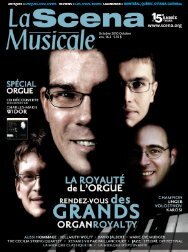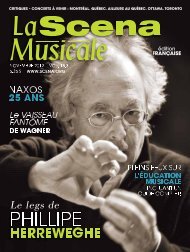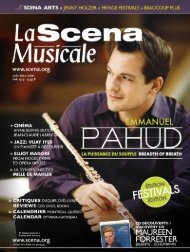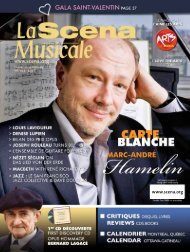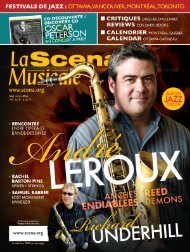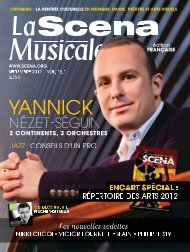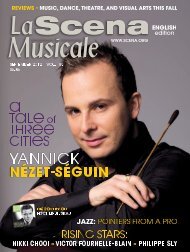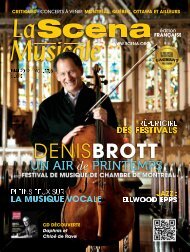You also want an ePaper? Increase the reach of your titles
YUMPU automatically turns print PDFs into web optimized ePapers that Google loves.
«<br />
CE N’EST PAS TOUS LES JOURS QU’ON<br />
DONNE LA CINQUIÈME DE TCHAÏKOVSKI,<br />
et pour moi, c’est là tout le problème. » Voilà ce<br />
que nous a confié le corniste de 32 ans Louis-<br />
Philippe Marsolais, ancien élève de l’École de<br />
musique Schulich de l’Université McGill, où<br />
nous l’avons rencontré. Il parlait de la place du<br />
cor dans l’orchestre : peu de partitions lui donnent<br />
l’occasion de briller autant que le solo au<br />
début du mouvement lent de cette œuvre.<br />
Aussi, Marsolais remplit son agenda de prestations<br />
de tout genre – concerts avec orchestre,<br />
musique de chambre, solos – en attendant de<br />
savoir vers quoi s’oriente sa carrière.<br />
Un corniste virtuose itinérant, cela se peut-il?<br />
Le dernier quart du 20 e siècle en a connu un:<br />
Barry Tuckwell, mais il a joué avec le London<br />
Symphony Orchestra pendant 13 ans avant de<br />
se lancer dans une carrière de soliste. Son grand<br />
rival, dans les pays germaniques, était Hermann<br />
Baumann. De nos jours, Radovan Vlatkovic a<br />
pris la relève; ce Croate fort talentueux se produit<br />
également avec le Mozarteum de Salzbourg. On<br />
parle aussi de Ben Jacks, cor solo du Sydney<br />
Symphony Orchestra. Un corniste globetrotteur,<br />
Martin Hackleman, a déjà joué pour le Canadian<br />
Brass, le Vancouver Symphony et bien d’autres<br />
ensembles, et on le retrouve dans les enregistrements<br />
du National Symphony de Washington. Un autre corniste<br />
endisqué est James Sommerville, ancien membre du Toronto<br />
Symphony et de l’Orchestre symphonique de Montréal, à présent<br />
cor solo du Boston Symphony. Le fait que ce Torontois<br />
dirige souvent le Hamilton Philharmonic en dit long sur ses<br />
aspirations de soliste, ou plutôt sur l’absence de celles-ci.<br />
Un peu plus jeune que ses illustres prédécesseurs, Marsolais<br />
leur emboîte le pas vaillamment. Il a remporté le deuxième prix<br />
au Concours de musique 2005 de l’ARD à Munich, compétition<br />
organisée par la radio bavaroise, l’une des rares à ne pas s’en<br />
tenir à l’inévitable trio violon-piano-voix. « Ce sont les<br />
Olympiques du cor», plaisante Marsolais, faisant allusion au<br />
calibre élevé des compétiteurs, tels Vlatkovic (premier prix<br />
1983) et Sommerville (deuxième prix 1988). Certes, la médaille<br />
d’or est revenue à Zabolcs Zempléni, cor solo de la Symphonie<br />
de Bamberg, mais notre virtuose était le seul lauréat nord-américain<br />
cette année-là, toutes catégories confondues. En plus de<br />
la médaille d’argent, il a remporté le premier prix pour l’exécution<br />
du morceau imposé, attirant l’attention du producteur allemand<br />
Dieter Oehms qui lui a demandé d’enregistrer pour son<br />
étiquette, avec le pianiste David Jalbert, de merveilleuses pages<br />
du répertoire romantique allemand. Notre virtuose a récemment<br />
réalisé avec le même partenaire un enregistrement pour<br />
ATMA, où la Sonate pour cor de Beethoven (que d’aucuns<br />
voient comme le plus négligé de ses chefs-d’œuvre) côtoie des<br />
œuvres d’étudiants et de disciples du grand maître, parmi lesquelles<br />
une surprenante sonate de Ferdinand Ries. À l’écoute de<br />
ces deux disques, on a l’impression d’entendre un musicien qui<br />
“<br />
EVERY WEEK IS NOT A TCHAIKOVSKY FIFTH SYMPHONY,”<br />
Louis-Philippe Marsolais said in a quiet corner of his<br />
alma mater, the Schulich School of Music of McGill<br />
University.“To me, this is the main problem.” Few readers<br />
would perceive this situation as a problem when it<br />
is put so simply. But the 32-year-old was making a particular<br />
point about the lot of the orchestral horn player:<br />
not every concert includes a performance opportunity<br />
as lavish as the solo that opens the second<br />
movement of that score. Which is precisely why<br />
Marsolais has filled his schedule with a mix of orchestra,<br />
chamber and solo duties while waiting, patiently,<br />
to see what trajectory his career will take.<br />
Can there be such a thing as a travelling horn virtuoso?<br />
In the last quarter of the 20 th century there was<br />
one, Barry Tuckwell, and even he played principal with<br />
the London Symphony Orchestra for 13 years before<br />
going solo. Only Hermann Baumann, in German-speaking<br />
lands, had a comparable reputation. These days the<br />
role is filled, mostly in Europe, by Radovan Vlatkovic, a<br />
much-admired Croatian with a day job at the<br />
Mozarteum in Salzburg. There is some buzz (and not<br />
the type that comes from the lips of inadequate horn<br />
players) about Ben Jacks, principal of the Sydney<br />
Symphony Orchestra.Well-travelled Martin Hackleman,<br />
formerly of the Canadian Brass and the Vancouver<br />
Symphony and many other ensembles, makes CDs from<br />
his current redoubt of the principal chair of the<br />
National Symphony in Washington. Another player<br />
with a clutch of CDs is James Sommerville, formerly of the Toronto<br />
Symphony and Montreal Symphony and now principal of the<br />
Boston Symphony. It says something about Sommerville’s solo<br />
ambitions, or lack thereof, that the native Torontonian spends much<br />
of his spare time conducting the Hamilton Philharmonic.<br />
Marsolais is behind these gents by a few years. Still, his achievements<br />
so far are considerable. Most noteworthy is second prize in the<br />
2005 ARD Music Competition in Munich,a contest run by the Bavarian<br />
Radio and one of the few major events in the world to veer beyond the<br />
standard triumvirate of violin, piano and voice. “The Olympics for<br />
horn,” Marsolais said, a description that can be validated by such winners<br />
as Vlatkovic (first prize, 1983) and Sommerville (second prize,<br />
1988). While Marsolais did not win a gold—that went to Zabolcs<br />
Zempléni, now principal horn of the Bamberg Symphony—he was the<br />
only laureate in any category that year from North America. In addition<br />
to his second prize he collected the prize for the best performance<br />
of the imposed piece. He also impressed the German producer Dieter<br />
Oehms as the hornist most worthy of a recording under the Oehms<br />
label, a luminous recital of German romantic repertoire with David<br />
Jalbert at the piano. More recently Marsolais has made a recording for<br />
ATMA with the same partner, matching Beethoven’s Horn Sonata<br />
(arguably the composer’s most neglected masterpiece) with works by<br />
Beethoven students and followers, including a remarkably accomplished<br />
Sonata by Ferdinand Ries. Both discs sound like the work of a<br />
solo-calibre musician. Alas, all the engagements on Marsolais’s calendar<br />
at the moment are orchestral and chamber collaborations.<br />
The relative scarcity of solo horn opportunities (despite four handsome<br />
concertos by Mozart and two by Richard Strauss) might have<br />
something to do with the reputation of the instrument for<br />
12 Novembre 2009 November




